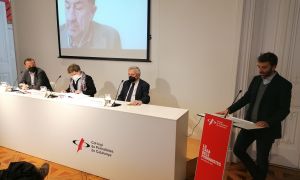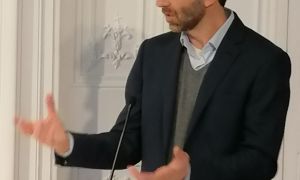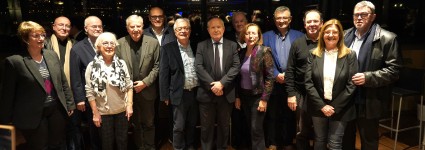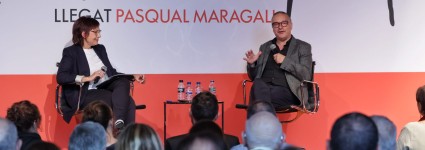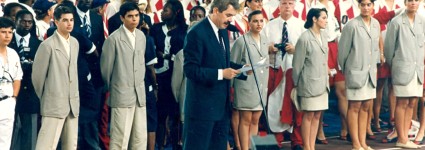The same day of the start of Russia's military attack on Ukraine coincided with the conclusion of the "What Europe Do We Want?" organized by the Fundació Catalunya Europa with the support of the European Parliament.
The question of the cycle became more relevant than ever because of the military action launched by Vladimir Putin in the face of the disbelief of many analysts and the attitude of Europe, which, again, after the Balkans, has not known to avoid a new war in the heart of the continent.
To answer the question, the Fundació Catalunya Europa brought together three expert speakers in the analysis of international relations:
· Patricia García-Durán, professor at the UB and researcher at the IBEI European Foreign Policy Observatory.
· Jaume Masdeu, La Vanguardia journalist and former correspondent in Brussels.
· Josep M. Lloveras, former Ambassador of the European Union to the Central African Republic, Serbia and Montenegro.
The event was moderated by the director of CIDOB, Pol Morillas, and presented by the director of the Fundació Catalunya Europa, Pau Mas.
In his speech, the director of the Fundació Catalunya Europa, Pau Mas, recalled that "in 1992 the conflict broke out in the Balkans, which Europe did not know how to avoid or resolve, and in Ukraine it has not been able to stop it for the time being. that is, some reforms need to be made, such as giving more powers to European foreign policy or establishing more coordination between armies".
For his part, the director of CIDOB, Pol Morillas, recalled that the conflict comes from afar, as "it is not the first episode we have experienced in Ukraine, but now Russia has acted by breaking all the consensus that had been reached in the last decades in international politics". Morillas explained that the current conflicts are very complex because many factors are involved in the commercial, economic, energy or technological fields. But "in this case, the conflict is based on a fallacious construction by Putin, who claims that Ukraine does not exist as a country, but is an invention to counter Russia's role in the world, and that it is led By this story, he aims to build the image that the one who is being attacked is the cause of the attack, and Putin insists that any bloodbath that occurs in Ukraine will be a consequence of the attitude of the Ukrainian government", explained the director of CIDOB.
What is the cause of the conflict?
"For me, Russia is clearly responsible for this conflict, despite all the propaganda tools of the Putin regime," said Jaume Masdeu, a journalist for La Vanguardia and a former correspondent in Brussels. In his analysis of the situation, Masdeu explained that "the conflict is based on a fictitious cause to try to create a new international order. In the future, the NATO alliance was reluctant to open its doors to Ukraine in 2008 to prevent Putin from using this excuse in the future, as has unfortunately happened. But the real cause, according to Masdeu, is that Putin wants to prevent Ukraine from moving closer to Europe and its system of democratic values. Viktor Yanukovych and Putin's subsequent reaction to the invasion of Crimea and the destabilization of the eastern provinces of Ukraine, so the current military attack is not a one-off event strategy to create a new international order and to establish a battle for the narratives of dominant discourse in the face of international public opinion".
In this sense, the former ambassador of the European Union, Josep M. Lloveras, was very graphic with the current situation: "watching the images on television of the beginning of the military attack in Russia I had the feeling of living a historical moment, just as it happened to me on October 9, 1989, when the Berlin Wall fell, I had the same feeling, but of the opposite sign, If then the division between East and West, the Cold War and a bipolar world disappeared, and we had the feeling that we were entering a world of peace, now I have the feeling that all this is falling apart and we are going backwards".
Lloveras, who was the EU's ambassador to Serbia and Montenegro, and is well acquainted with Eastern Europe, also emphasized, as a positive fact, that between one image and another, "Europe has integrated thirteen countries, NATO has also added new members, and a minimal European foreign security and defense policy has been created that did not exist before".
At the same time, it also coincided with the importance of the war narrative and narrative that the Kremlin seeks to impose on public opinion and the media. Lloveras said he "had never seen so much fake news and lies in action together to justify a war". "Vladimir Putin says he is intervening in Ukraine to denationalize the country and to defend the Russians from ethnic cleansing, among other atrocities. These are false stories that are used to justify a war, and I think that should make us think. seriously about the dangerous role that these lies speeches play in action".
"What is happening is another drop in the race to lead a new international order", said Patricia García-Durán, a professor at the UB and a researcher at the Barcelona Institute for International Studies (IBEI). According to the expert, Putin's reaction is a reflection of the race between the United States and China, together with Russia, to lead a new world order and set the rules for the fourth industrial revolution based on the digital economy. new technologies and innovation. "Security and trade policies are becoming more and more confusing, giving way to what we call geoeconomics. An example is the long-running trade war between the United States and China. With that, and with actions like Putin's. The aim is to challenge the liberal economic order, the system of values ??that make up Europe's DNI and create a destabilization that will have serious economic consequences".
García-Durán did not draw a very encouraging picture. "The economic impact of the war will be very negative as a result of Western economic sanctions for isolating Russia, Europe's largest supplier of energy, gas and oil. This will lead to more inflation, less trade and energy. It will be more expensive, and the biggest beneficiary of all this will be China, which has never broken off trade relations with Russia, and the Russian market will be all its own". A situation that he also believes will lead us to a reform of the world economic order and to a division of the world into blocs. A bipolar world reminiscent, at a distance, of the scene before the fall of the Berlin Wall, to which Josep M. Lloveras referred when he saw images of the invasion of Ukraine on television.
Another indicator of this process towards a divided world, pointed out Jaume Masdeu, "are the coincidences between Russia and China, which recently signed a joint document defending a democracy based on traditions and a return to the law. of the strongest, making it clear that they do not want any kind of Western interference in their areas of influence".
What is Vladimir Putin's goal?
For former ambassador Josep M. Lloveras, "Vladimir Putin's real goal is to destroy Ukraine as a pro-European, pro-Western and stable country, to weaken the government and create a permanent instability to cut a model that could be a bad example for Russian society".
Faced with the uncertainty of how far Putin will be able to go, analysts tried to dismantle the Russian president's official speech. "Is Russia really under threat? Are its borders surrounded by enemies, as Putin says?" Lloveras wondered, adding: I think that what really worries him is the threat of the European model and the fact that Ukraine will grow economically, consolidate its democracy and gain stability for years".
Journalist Jaume Masdeu pointed out that "unfortunately, Putin has ended up acting militarily. For the last fifteen years we have encountered an economic crisis, we have suffered a pandemic and now we are facing a new war in the heart of Europe of a magnitude We don't know yet, because unlike the war in the Balkans, there is now the direct intervention of a nuclear power like Russia".
For his part, Pol Morillas stated that “we are facing a leader who has acted in a very irrational and absolutely vengeful way.” His goal is to control Ukraine, as he did with the Crimean War in 2014. "He intends to dismantle Ukraine as a country and bring down his government in order to set up a government close to his interests," he added, and that it does not exist as a united bloc, and therefore seeks its destabilization. The conflict also seeks to prevent Ukraine from joining the EU and NATO".
What will be the role of Europe?
Faced with this situation, Pol Morillas acknowledged that "Europe has always shown difficulties in dealing with crisis scenarios that are not in line with its capacity for external action. The EU has always based its external action on logic overcoming conflicts but not participating in conflicts, although fortunately we are seeing some interesting changes in relation to Russia".
Changes that are taking place, especially in the field of geoeconomics, stressed Professor Patricia García-Durán. "Until now, Europe's strategy has been to stay out of the trade war between the United States and China, but without renouncing the use of trade as an element of foreign policy, in certain situations, from the point of view of That is why the EU is acting with economic sanctions against Russia as a form of pressure to leave Ukraine, and the EU is developing a system to impose economic sanctions on third parties without the need for take these decisions unanimously by all EU Member States".
All the speakers agreed that this war will make us consider the role of Europe in the field of economic sanctions and economic power, international security and its strategic autonomy with respect to other actors and powers such as the United States.
On the possibility of military intervention by allied countries on the ground, Morillas explained that "according to NATO Article 5 (*) of collective defense, allied countries can not intervene because Ukraine, despite the good It does not yet form part of the Alliance. they feel threatened, which could be seen in the light of the fact that the conflict is very close to the borders with Poland and other NATO allies".
Finally, Jaume Masdeu defended that in spite of everything "we must be optimistic and believe that we will overcome it with sanctions and measures of pressure to stop the war and make Putin give up his intentions to establish a new regime in Ukraine".
Josep M. Lloveras also expressed hope that, although Europe has been unable to stop a second war on the continent, the current crisis will serve to meet the outstanding challenges. "It is urgent to strengthen the European foreign policy of security and defense," concluded Lloveras, with the same call launched at the beginning of the event by the director of the Fundació Catalunya Europa, Pau Mas. The round table closed the cycle of debates "What Europe do we want?", But opened many questions that will surely need to be further analyzed.
(*) Article 5. The Parties agree that an armed attack on one or more persons, whether committed in Europe or in North America, shall be considered as an attack directed against all of them and, accordingly, agree that if such an attack occurs, each of them, in exercise of the right of individual or collective self-defense, recognized by Article 51 of the Charter of the United Nations, shall assist the party or parties so challenged, and shall then adopt, individually and in the measures it deems necessary, including the use of armed force, to restore and maintain security in the North Atlantic region.



